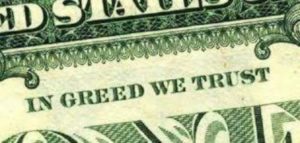Economic theory as ideology – Asad Zaman
 Ideology and Science are diametrically opposed to each other. An ideology is a set of beliefs that is maintained even in face of strong empirical evidence to the contrary. Science is primarily concerned with explaining the empirical evidence. Theories which conflict with observations are rejected. This does not mean that ideology is necessarily wrong or bad – we must maintain our belief in justice, morality, honesty, trust, integrity without any empirical evidence; indeed, even when strong empirical evidence suggests that these beliefs will not bring us popularity or personal benefits.
Ideology and Science are diametrically opposed to each other. An ideology is a set of beliefs that is maintained even in face of strong empirical evidence to the contrary. Science is primarily concerned with explaining the empirical evidence. Theories which conflict with observations are rejected. This does not mean that ideology is necessarily wrong or bad – we must maintain our belief in justice, morality, honesty, trust, integrity without any empirical evidence; indeed, even when strong empirical evidence suggests that these beliefs will not bring us popularity or personal benefits.
However, ideological beliefs in wrong ideas can blind us to the facts and prevent learning which is essential to progress. US economist Joseph Stiglitz has remarked that modern Economics represents the triumph of ideology over science. This essay explains the reasons for his remarks.
Modern economic theory is founded on axioms for rational behavior, which is equated with selfish behavior by economists. No empirical evidence is presented for this axiom; rather it is taken to be self-evident. In the 1980’s some psychologists, perplexed by the economic theories of human behavior, decided to test these theories via some experiments. Amazingly, nearly all experiments conducted showed human behavior to be strongly in conflict with the economic axioms. A widely replicated experiment is “The Prisoner’s Dilemma”. This game is similar to many real life situations, where an individual can benefit by betraying a social agreement, as long as other parties stick to the agreement. However, if all people betray the agreement, then everybody loses. Economic theory predicts that selfish individuals will betray agreements, and social conventions of cooperation will break down. However, real life experiments indicate that cooperation and maintenance of social conventions, even with complete strangers, is quite common. Generally, economic theory assumes that selfish motives dominate all others. However, real life behavior in experiments display a large variety of motivations, based on reciprocity, trust, generosity, charity, morality, and other motives which are assumed absent in economic theories.
For a very long time, economists refused to take results from experiments seriously, because these were in direct conflict with axioms at the heart of economic theories. The empirical failure of economic axioms led to the creation of “Behavioral Economics,” which studies actual behavior of human being. In any scientific field, “behavioral economics” would be the center of attention, since it matches the observational evidence about human behavior. Furthermore, the axiomatic theory, which is contradicted by the empirical evidence, would be a long forgotten idea belonging to the primitive history of economic science. Surprisingly, main- stream economic textbooks, used all over the planet, continue to teach axiomatic theories of human behavior as if they are true, while behavioral economics remains neglected and ignored.
Why do economists maintain an ideological commitment to patently false theories of human behavior? Certainly it is not because these theories are noble and elevating. In fact, many observers have argued that these theories create immoral behavior, by teaching that selfishness, without concern for morality or society, is rational for everyone, and good for society. For example, Nobel Laureate Milton Friedman taught that businesses should maximize profits, without any concern for social responsibility. Given this license, multinational corporations have gone on a rampage, exploiting natural resources by using methods which threaten to destroy the planet. The easiest way to make a profit is to appropriate a price-less natural treasure, like a rainforest, and chop it down for timber. Losses from industrial wastes are changing the composition of the atmosphere, the oceans, lakes and rivers, and are inflicting costs on all human beings, but creating profits for corporate coffers. This strategy is called ‘socializing the losses and privatizing the gains’. With massive profits, it is easy to buy politicians to prevent valid environmental concerns from getting in the way. The book Merchants of Doubt documents a well funded campaign to create doubt about climate change, so that corporations can continue to make profits while destroying the planet. The persistence of economic theories which celebrate and glorify these poisonous ideologies of personal greed and social irresponsibility can be traced to corporate funding of think-tanks and research which promote “free markets”. The charms of “freedom” propagated by economic ideologies conceal the ugly reality of corporate freedom and wage slavery of the masses
Sources
-
Real World Econ Rev, 17 July 2016 https://rwer.wordpress.com/2016/07/17/economic-theory-as-ideology/
-
WEA Pedagogy Blog, 13 July 2016 https://weapedagogy.wordpress.com/2016/07/13/economic-theory-as-deology/#more-1259
Dr Asad Zaman is a Professor at the International Institute of Islamic Economics, International Islamic University. He received his PhD in Economics from Stanford University in 1978 and has since held a number of academic and advisory positions in the US and Pakistan.






























